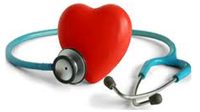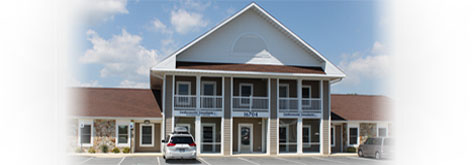Implantable Cardiac Device Clinic (pacemaker)
1. What is the difference between a pacemaker and an implantable cardiac defibrillator(ICD)?
A pacemaker is for slow heart beats. It is there as a back up if your own hearts electrical system beats too slowly. An ICD is for certain patients who may be at high risk for sudden cardiac arrest, or a very fast dysrhythmia. All ICD devices we implant today are pacemakers as well.
2. Can I still use my cell phone and microwave?
Absolutely. The newer devices are much better filtered than older models. We do ask that you make sure your microwave or any other appliance you may be near is well grounded and in good working order. Cell phones and cordless phones are fine, but we ask you to not keep your cell phone in the pocket directly over your device.
3. What will it feel like if my ICD shocks me?
That is a very individualized experience. Some patients have an ICD for years and it never needs to treat them. Some patients have had multiple shocks for dangerously fast heart rates. Most people say it feels like "a horse kicks you in the chest". Some people report a "bang" or "pop" while others don't know it has even happened. It is not reported as painful, just startling. Today's ICDs can be very specifically programmed to attempt other therapies before resorting to a shock. There are also many ways we can program your ICD to avoid any treatment unless absolutely needed. It is very important to remain calm if a shock does occur and to remember, it is there to stop a potentially lethal heart rhythm. You have a guardian angel that most people do not have.
4. Will I feel my pacemaker pacing me?
No, the small impulse delivered to pace your heart should not be strong enough for you to even notice. Sometimes pacemaker/defibrillator(ICD) patients are a bit more aware of their heart beats.
 5. Will my pacemaker/ICD fix my atrial fibrillation?
5. Will my pacemaker/ICD fix my atrial fibrillation?
Probably not by itself. Pacemakers are very commonly used in atrial fibrillation patients for many reasons. Many times your heart rate is very irregular and unpredictable while you are in atrial fibrillation. The pacemaker prevents your heart from beating too slow and also helps to regulate your bottom chambers. In addition, we may need to use stronger heart medication to control the atrial fibrillation or control how fast your bottom chambers are responding. These medicines usually make you heart rate slower. The pacemaker will prevent it from going too slow.
6. Why do some people only get one pacing lead, and others get two or three?
There are three types of implants your doctor may do based on your history. A single lead system is typically used in patients who have atrial fibrillation all the time. It can also be used in an ICD patient who strictly needs the ICD portion of their device with little need for the pacemaker side. The most common is a dual lead system, that has one pacing lead in the top right chamber and one in the bottom right chamber. These are for patients who may need the pacemaker side of the ICD and for patients who's top chambers are in a regular rhythm, just too slow of a heart rate. The third is the most advanced. It is for patients who have an enlarged heart, low heart function, and some slowing of the electrical conduction to the left ventricle. It has a lead in the right top chamber, right bottom chamber, and a third lead to the left bottom chamber. This can either be a pacemaker or ICD. You may start with one type, and over time, need another type. We call this an "upgrade".
7. How long do the batteries last in the devices?
A pacemaker today should last in the 8-11year range. An ICD today should last from 4-8 years. Of course, there are a lot of factors that we consider. How often it is kicking in, if you require other therapies, and if additional diagnostic tools are in use.
8. What happens when I need a new battery?
We actually change the entire device out for a new one. The technology is changing so fast, that there are new models every year or so. It is usually an outpatient procedure at the hospital. The devices give us a tremendous amount of warning so they will not just stop working all of the sudden. This is why routine follow up in your pacemaker or ICD clinic is very important.
9. What is this "remote monitor" I hear about?
Most of the manufacturers today have some type of home monitoring service. It plugs into your telephone line, and either automatically, or by a push of a button, can transmit a very comprehensive report to your device clinic. These are very easy to use, give us a tremendous amount of information, save the patients trips into the office for routine testing, and are covered by all the major health insurance carriers. This is different than the "transtelephonic checks" we have done in the past. This can be explained fully by your device nurse/clinic staff.
10. Can I get back to my usual lifestyle after I have a pacemaker or ICD put in?
Absolutely. There may be minor precautions, but these devices are implanted to help you get back to your normal lifestyle. They are not put in to limit you. It is very important to tell any healthcare provider that you have a device implanted. Also, you should keep your ID card with you all the time. Some very rough contact sports may be limited, as well as industrial welding and tractor trailer driving(ICD). As of 2012, there is a MRI compatable pacemaker and lead system that can be implanted. Very strong electromagnetic fields are a potential issue, but there are VERY few things in day to day life that will interfere. Please ask your cardiologist/device clinic nurse if you have very specific questions.
If you have other questions, please call our office at 302-644-1233. If this is an emergency, please call 911.




